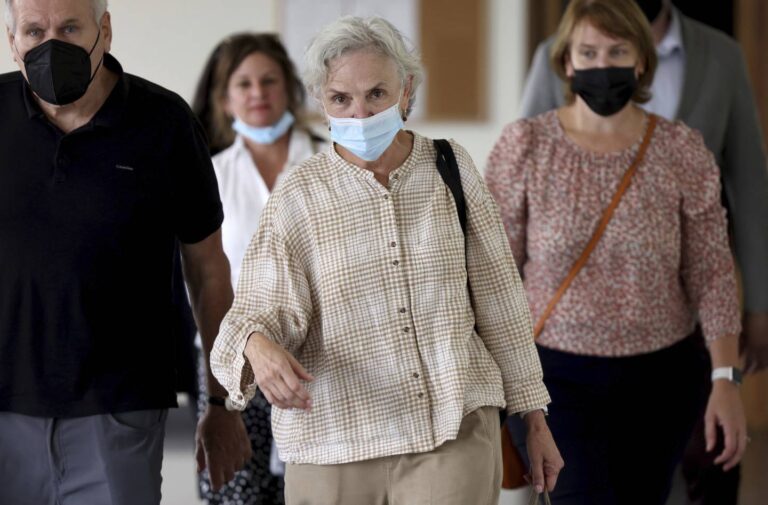Sterigenics, its parent company and a corporate predecessor should pay $346 million for exposing a Willowbrook woman and thousands of others to cancer-causing ethylene oxide, her attorney urged a jury Thursday.
Sue Kamuda, a breast-cancer survivor who lives a third of a mile from a former Sterigenics facility, should get $21 million for physical and emotional suffering and the loss of her normal life, attorney Patrick Salvi told jurors at the end of a five-week trial in a Daley Center courtroom.
Advertisement
Citing corporate documents and emails, Salvi said the companies should be forced to pay another $325 million as punishment for taking too long to install pollution-control equipment and attempting to undermine science showing the toxic gas is harmful at extremely low levels.
“These companies need to be held accountable,” Salvi urged jurors. “Do it, not just for Sue but for everyone.”
Advertisement
Kamuda is the first of more than 700 people seeking recompense from Sterigenics, an Oak Brook-based company that released cancer-causing ethylene oxide into neighborhoods surrounding a Willowbrook facility where the toxic gas was used for decades to sterilize medical devices.
The facility was built in the early 1980s by another defendant, a company now known as Griffith Foods. Also on trial is Sotera Health, which absorbed Sterigenics after a series of mergers, corporate restructurings and private equity deals.
Lawyers for Sterigenics/Sotera argued Salvi failed to prove that pollution from the Willowbrook facility caused Kamuda’s cancer.
Matthew Malinowski walked the jury through differences between the U.S. Enviornmental Protection Agency’s conclusions about ethylene oxide, also known as EtO, and the odds any one person’s cancer could be traced back to a specific source of pollution.
The agency’s latest assessment of EtO includes a caveat cautioning the document cannot be used to predict disease, Malinowski noted as an assistant portrayed it on a courthouse screen.
“They are trying to distract you from the actual science,” Malinowski told the jury.
The EPA’s 2016 report — a risk assessment based on decades of animal research and a study of 17,000 workers at sterilization facilities — found that breathing even tiny amounts of ethylene oxide during a person’s lifetime can trigger breast cancer, leukemia and lymphomas. Two panels of independent researchers agreed with the agency’s conclusions.
Malinowski argued the report’s conclusions are intended to direct public policy, not to influence the outcome of a personal injury lawsuit.
Advertisement
Sterigenics closed the Willowbrook plant in 2019 under pressure from community groups, local officials, state lawmakers, members of Congress and Gov. J.B. Pritzker, who at one point that year banned the company from using ethylene oxide.

During the trial, the company’s lawyers noted the Illinois EPA had approved a new permit that would have prohibited Sterigenics from releasing more than 85 pounds of the toxic gas annually, down from 4,600 pounds the company reported emitting during 2017.

Afternoon Briefing
Daily
Chicago Tribune editors’ top story picks, delivered to your inbox each afternoon.
The only reason company officials left Willowbrook, the lawyers argued, is their landlord refused to renew their lease.
Reports from state and federal health agencies tell a more complicated story.
An analysis by the Illinois Department of Public Health found that women and girls living near Sterigenics between 1995 and 2015 suffered higher than expected rates of certain cancers associated with long-term exposure to ethylene oxide.
An investigation by the U.S. EPA concluded that Sterigenics’ pollution increased the risk of developing cancer for people living as far as 25 miles away from the Willowbrook facility. Other suburbs with the highest risks included Darien, Burr Ridge, Hinsdale, Indian Head Park and Western Springs.
Advertisement
Sterigenics and its corporate predecessors emitted considerably more ethylene oxide when Kamuda became a Willowbrook resident ― 169,000 pounds in 1987 alone, according to company documents filed with the EPA.
A 2019 Chicago Tribune investigation documented how Sterigenics helped fund research by industry-connected scientists claiming ethylene oxide is harmful only at high levels of exposure.
Chemical manufacturers and their customers continue to cite the studies they financed to raise doubts about the dangers of EtO and to fend off more stringent regulation.







